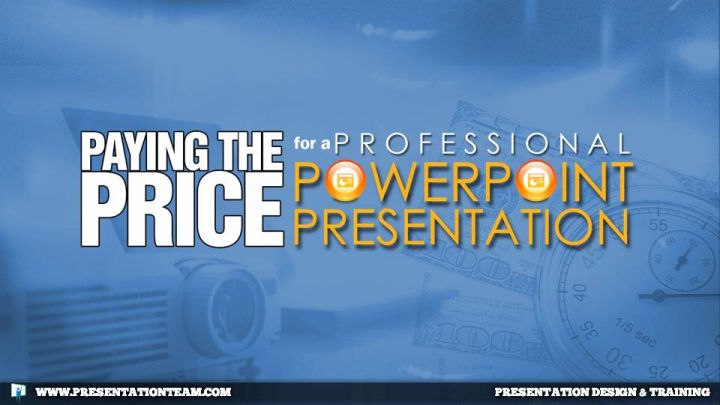Paying the Price for a Professional PowerPoint Presentation

Why professional PowerPoint presentation design costs what it costs…and how to justify the expense by focusing on your Return on Investment.

Sometime around 400 B.C. the Greek physician Hippocrates declared, “Art is Long…Life is Short.”1
Nearly 2,500 years later, the aphorism still resonates to anyone who is committed to their craft, spending countless hours passionately practicing their profession. Michelangelo toiled for four years painting the famous Sistine Chapel ceiling. J.K. Rowling wrote Harry Potter over seven years. And the New World Trade Center will be completed 12 years after the terror attacks of September 11, 2001 (although construction on the New Freedom Tower started in 2006).
Yes, Mr. Client, it really does take time!

As a presentation design professional and trainer, I am keenly aware of the time and related costs involved in creating professional PowerPoint presentations. I work efficiently- not hastily- always aware of deadlines and budgets, and work to calculate time and costs with a scientifically-grounded formula built upon years of experience. Yet when I share my price estimates with business prospects and clients, they are sometimes surprised and struck with sticker shock.

Time…Money…Quality: Keeping it all balanced
A colleague once asked me, “How would you like it? Fast…cheap…or good? Pick two.”
The presentation process parallels the creative design process, but with the added component of writing, editing, and assimilating textual content & key messages. To most people, PowerPoint is one of the fastest and easiest programs; most anybody can work with it to create a simple presentation. But using this powerful presentation program properly takes a rare blend of time, testing, and years of focused experience.
Creating a high-end graphical presentation can be a time-intensive task. Sometimes the creative juices just flow perfectly and it comes together fast and bright. Other times, it can be a black hole of wasted time, endless edits, and mind-numbing wheel-spinning. Working among others- presentation by committee- can be even more laborious, as people spend more time “talking about it” rather than “acting on it.” Applying effective Presentation Time Management techniques can help produce quality presentations on time and within budget.
Let’s estimate the time for creating a simple 30 page company overview presentation…
| TASK | # of Hours |
| Researching/Writing/Creating the Core Text Content | 10 |
| Designing the Graphical Template & Theme + Layouts & Animations | 6 |
| Researching/Purchasing/Designing 10 Graphics working with Photoshop + inserting in PPT | 10 |
| Designing/Editing 5 Tables & 3 charts of Financial Information & Analytics | 6 |
| Company Org Charts and Process Diagrams | 3 |
| Meetings/Admin | 5 |
| TOTAL | 40 |
Working from scratch, this project would take 40 hours! And that’s assuming everything came together fast and easy. At $100/hour, the cost would be $4,000.
Even at a race pace of 45 minutes average per slide (some faster/some slower), this 30 page deck would take 22.5 hours…or $2,250.
Heck…simply spending 1 minute per page reviewing and looking at this 30 pager will take half-an-hour.
Typical fees for a presentation designer & agency

According to HR specialists, the average hourly pay rate for an experienced presentation designer or freelancer (skilled in Photoshop, business presentation writing/editing), is $50 to $75 per hour. Junior designers work at $30 to $50 per hour.
Creative staffing agencies like Aquent and Creative Circle often bill-out their clients at $70/hour to $100/hour.
Most presentation design agencies prefer to bill by the project, but calculate their costs using hourly rates starting at $100/hour. Some agencies’ top designers or consultants are billed at a rate of over $250/hour. Presentation design agencies often have the advantage of a pool of experienced talent, and large graphics libraries for fore efficient and creative design.
The Presentation Team has several pricing models. Companies wanting ongoing presentation support use a retained-services / contractual working model to save costs.
Justifying the costs and selling the presentation ROI to management

“Why do we need to pay this much for a PowerPoint presentation?”
That question- typically asked by upper management to a middle manager- has killed numerous potential presentation projects at my firm. Senior executives often don’t realize the time involved in creating presentations. They are either too detached from the behind-the-scenes development of presentations…or simply don’t recognize the importance of a quality presentation.
Not just another document, PowerPoint is on the frontline of business communications

To many executives, “The Presentation” deck is viewed as just another document or report. But presentation visuals are often seen by more people- internally and externally- than the average report. From quarterly stock earnings reports, to training presentations, to investor pitch decks…the PowerPoint presentation is often on the front-line of corporate communications.
Poor PowerPoint practices are everywhere!

Yet all too often, the development of these essential presentations are handled internally by administrative assistants or the employee directly. The result: a mosh pit of tremendous text, boatloads of bullets, gregarious graphs, and irrelevant information. Weak presentations subconsciously affect a viewer’s perception of a company. Presentations should reflect the highest standards of any company.
Top companies recognize the importance of “The Presentation”

Indeed, companies who have recognized the importance of “The Presentation” and its reflection on their brand and image (not to mention its effectiveness as a critical communications medium) have a solid edge over their competition. Many Fortune 500 firms have a dedicated presentation design department, often working alongside the marketing, PR, and/or meeting & events departments. They often have established guidelines for their presentation visuals (usage, colors, spacing, fonts, etc.) and a well-developed presentation template/theme.
Emphasize Value for Buy-In from Upper Management

To a presentation project champion or manager trying to sell the value of a professional presentation to management, its vital to emphasize the value that a well-written and well-designed presentation can have on the company’s image. A $10K investment in a professionally-designed analyst or investor presentation is a small price to pay for a communications tool that will generate exponentially higher revenue.
And even if the presentation never gets shown to an outside audience, its design should be no-less compelling. Often, the content that is created for a small internal “discussion presentation” can be repurposed for a more important company presentation.
Outsourcing can save time and money

Outsourcing a PowerPoint presentation to a professional presentation design firm can actually help companies save time and money, by allowing them to focus on their core competencies rather than relying on internal resources. Marketing experts and graphics designers- skilled as they might be- often do not have the same skillsets and as an experienced presentation specialist.
Presentations have a long life span!

Many presentations live-on, long after the show is over. More companies are uploading their key presentations to their websites, or sharing them on SlideShare.net. Indeed, The Presentation is more visible than ever, and should be given the same level of respect and budget as Sales & Marketing collateral, brochures, websites, and corporate videos.
Presentation development is a blend of art and science

If the good doctor Hippocrates was around today and tasked to deliver a PowerPoint presentation at a local college, I’m sure he would recognize the artistry and time involved…and wouldn’t think twice about partnering and paying for a true presentation professional to get the job done right. Art is long.
Cost, design, How much does a powerpoint cost, Paying for PowerPoint, powerpoint, presentation, Price, ROI



























